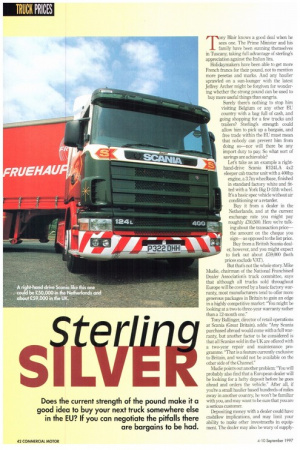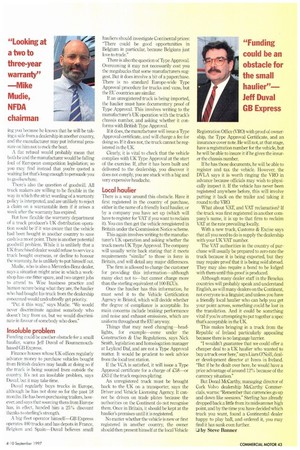IRO PRICES
Page 44

Page 45

If you've noticed an error in this article please click here to report it so we can fix it.
Does the current strength of the pound make it a good idea to buy your next truck somewhere else in the EU? If you can negotiate the pitfalls there are bargains to be had.
ny Blair knows a good deal when he sees one. The Prime Minister and his family have been sunning themselves in Tuscany, taking full advantage of sterling's appreciation against the Italian lira. Holidaymakers have been able to get more French francs for their pound, not to mention more pesetas and marks. And any haulier sprawled on a sun-lounger with the latest Jeffrey Archer might be forgiven for wondering whether the strong pound can be used to buy more useful things than sangria.
Surely there's nothing to stop him visiting Belgium or any other EU country with a bag full of cash, and going shopping for a few trucks and trailers? Sterling's strength could allow him to pick up a bargain, and free trade within the EU must mean that nobody can prevent him from doing so—nor will there be any import duty to pay. So what sort of savings are achievable?
Let's take as an example a right hand-drive Scania R124LA 4x2 sleeper cab tractor unit with a 400hp engine, a 3.7m wheelbase, finished in standard factory white and fitted with a York Big D fifth wheel. It's a basic spec vehicle without air conditioning or a retarder.
Buy it from a dealer in the Netherlands, and at the current exchange rate you might pay roughly £50,500. Here we're talking about the transaction price— the amount on the cheque you sign as opposed to the list price. Buy from a British Scania dealer, however, and you might expect to fork out about But that's not the whole story Mike Mudie, chairman of the National Franchised Dealer Association's truck committee, says that although all trucks sold throughout Europe will be covered by a basic factory warranty, most manufacturers tend to offer more generous packages in Britain to gain an edge in a highly competitive market: "You might be looking at a two to three-year warranty rather than a 12-month one." Tony Ballinger, director of retail operations at Scania (Great Britain), adds: "Any Scania purchased abroad would come with a full warrant-37, but another factor to be considered is that all Scanias sold in the UK are offered with a two-year repair and maintenance programme. "That is a feature currently exclusive to Britain, and would not be available on the other side of the Channel." Mudie points out another problem: "You will probably also find that a European dealer will be looking for a hefty deposit before he goes ahead and orders the vehicle." After all, if you're a small haulier based hundreds of miles away in another country, he won't be familiar with you, and may want to be sure that you are a serious customer. Depositing money with a dealer could have cashflow implications, and may limit your ability to make other investments in equipment. The dealer may also be wary of supply ing you because he knows that he will be taking a sale from a dealership in another country, and the manufacturer may put informal pressure on him not to rock the boat. A flat refusal would probably mean that both he and the manufacturer would be falling foul of European competition legislation; so you may find instead that you're quoted a waiting list that's long enough to persuade you to go elsewhere. There's also the question of goodwill. All truck makers are willing to be flexible in the way in which the strict wording of a warranty policy is interpreted, and are unlikely to reject a claim on a warrantable item if it arises a week after the warranty has expired. But how flexible the warranty department of a truck producer's UK distribution operation would be if it was aware that the vehicle had been bought in another country to save cash is a moot point. There is another potential goodwill problem. While it is unlikely that a UK franchised dealer would refuse to service a truck bought overseas, or decline to honour the warranty, he is unlikely to put himself out. Mudie, who is also a Mercedes-Benz dealer, says a situation might arise in which a workshop has one fitter spare, and two urgent jobs to attend to. Wise business practice and human nature being what they are, the haulier who had bought his truck from the dealership concerned would undoubtedly get priority, "Put it this way," says Mudie. "We would never discriminate against somebody who doesn't buy from us, but we would discriminate in favour of somebody who does." Insoluble problem Funding could be another obstacle for a small haulier, warns Jeff Duval of Bournemouthbased GB Express. Finance houses whose UK offices regularly advance money to purchase vehicles bought from British dealers may baulk at doing so if the truck is being sourced from outside the country. It's not an insoluble problem, says Duval, hut it may take time. Duval regularly buys trucks in Europe, although he has not done so for the past 18 months. He has been purchasing trailers, however, and says that sourcing them from Europe has, in effect, handed him a 25% discount thanks to sterling's strength. A big fleet operator himself—GB Express operates 400 trucks and has depots in France, Belgium and Spain—Duval believes small hauliers should investigate Continental prices: "There could be good opportunities in Belgium in particular, because Belgians just love to trade." There is also the question of Type Approval. Overcoming it may not necessarily cost you the megabucks that some manufacturers suggest. But it does involve a bit of a paperchase. There is no standard Europe-wide Type Approval procedure for trucks and vans, but the EU countries are similar. If an unregistered truck is being imported, the haulier must have documentary proof of Type Approval. This involves writing to thr manufacturer's UK operation with the truck's chassis number, and asking whether it conforms with British Type Approval. If it does, the manufacturer will issue a Type Approval certificate, and will charge a fee for doing so. If it does not, the truck cannot be registered in the UK. Clearly, it is vital to check that the vehicle complies with UK Type Approval at the start of the exercise. If, after it has been built and delivered to the dealership, you discover it does not comply, you are stuck with a big and very expensive headache. Local haulier There is a way around this obstacle. Have it first registered in the country of purchase, either in the name of a friendly local haulier, or by a company you have set up (which will have to register for VAT if you want to reclaim it). You can then get the vehicle reregistered in Britain under the Commission Notice scheme. This again involves writing to the manufacturer's UK operation and asking whether the truck meets UK Type Approval. The company will usually write back stating that it meets requirements "similar" to those in force in Britain, and will detail any major differences. The firm is allowed to charge the customer for providing this information—although many elect not to—but cannot charge more than the sterling equivalent of 100 ECUs. Once the haulier has this information, he must send it to the Vehicle Certification Agency in Bristol, which will decide whether the degree of compliance is acceptable. Its main concerns include braking performance and noise and exhaust emissions, which are uniform throughout the EU anyway. Things that may need changing—head lights, for example come under the Construction & Use Regulations, says Nick Smith, legislation and homologation manager at Leyland Daf, and are not a Type Approval matter. It would be prudent to seek advice from the local test station. If the VCA is satisfied, it will issue a Type Approval certificate for a charge of .£58—or £83 if the truck requires plating. An unregistered truck must be brought back to the UK on a transporter, says the Driver and Vehicle Licensing Agency. It cannot be driven on trade plates because the authorities on the Continent do not recognise them. Once in Britain, it should be kept at the haulier's premises until it is registered. No matter whether the vehicle is new or first registered in another country, the owner should then present himself at the local Vehicle Registration Office (VRO) with proof of ownership, the Type Approval Certificate, and an insurance cover note. He will not, at that stage, have a registration number for the vehicle, but he will be able to insure it if he gives the insurer the chassis number. If he has those documents, he will be able to register and tax the vehicle. However, the DVLA says it is worth ringing the VRO in advance because officials may wish to physically inspect it. If the vehicle has never been registered anywhere before, this will involve putting it back on the trailer and taking it round to the VRO. What about VAT, and VAT reclamation? If the truck was first registered in another company's name, it is up to that firm to reclaim VAT at the rate prevailing locally. With a new truck, Customs & Excise says that all you need to do is supply the dealership with your UK VAT number. The VAT authorities in the country of purchase will usually be prepared to zero-rate the truck because it is being exported, but they may require proof that it is being sold abroad. They may also require a bond to be lodged with them until this proof is produced. Although many dealer staff in the Benelux countries will probably speak and understand English, as will many dealers on the Continent, not everyone is a linguist; and unless you have a friendly local haulier who can help you get your point across, something could be lost in the translation. And it could be something vital if you're attempting to put together a spec that's acceptable in the UK. This makes bringing in a truck from the Republic of Ireland particularly appealing because there is no language barrier. "I wouldn't guarantee that we could offer a cheaper deal to a UK haulier who wanted to buy a truck over here," says Liam O'Neill, dealer development director at Iveco in Ireland. "But if he he dealt over here, he would have a price advantage of around 12% because of the currency situation." But Donal McCarthy, managing director of Cork Volvo dealership McCarthy Commercials, warns: "Remember that currencies go up and down like seesaws." Sterling has already dropped back a little from its midsummer high point, and by the time you have decided which truck you want, found a Continental dealer happy to play ball, and ordered it, you may find it has sunk even further. Ea by Steve BannerTags








































































































